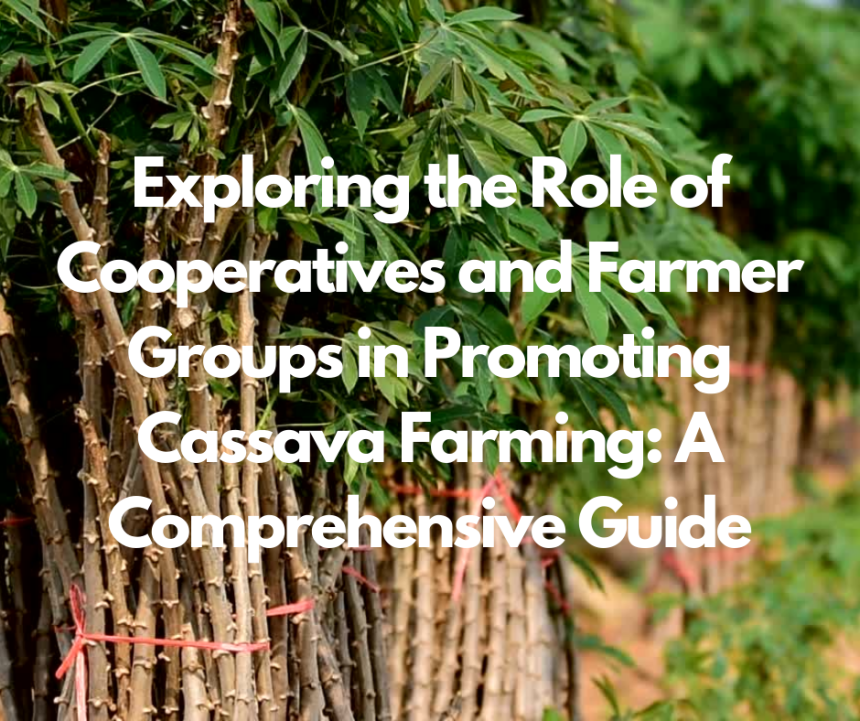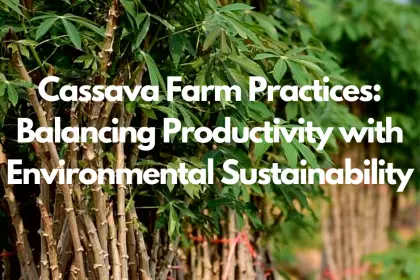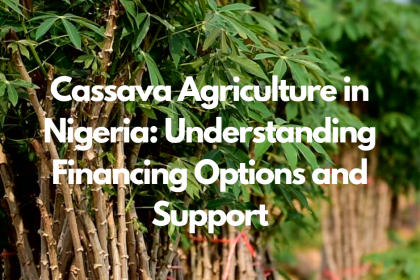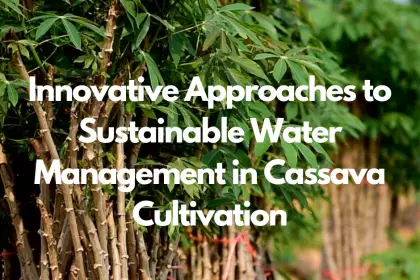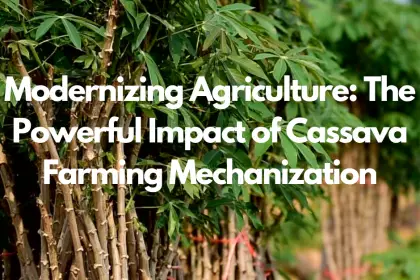Cassava stands as a pivotal crop within Nigeria’s agricultural landscape, particularly flourishing in the southern regions while also gaining prominence across other areas of the country. As the world’s largest cassava producer, Nigeria’s annual yield exceeds 34 million tonnes of tuberous roots, primarily cultivated by small-scale farmers with rudimentary tools. These farmers, encompassing a significant portion of women contributing approximately 58-67% of the total agricultural labor in key zones, face numerous challenges despite cassava’s essential role in their livelihoods and the national economy.
Understanding the role of cooperatives and farmer groups in promoting cassava farming emerges as a crucial aspect of enhancing productivity and sustainability within this sector. These entities are pivotal in strengthening market access, enhancing negotiation power, and facilitating the adoption of sustainable farming practices. Additionally, they play a key role in capacity building and providing access to agricultural innovations through research funding. This article aims to dissect the multifaceted contributions of cooperatives and farmer groups, illuminating their potential to transform cassava farming from a subsistence-based activity to a thriving, market-driven sector.
The Purpose and Function of Cooperatives and Farmer Groups in Cassava Farming
Cooperative societies and farmer groups play a crucial role in the cassava farming sector by fostering collaboration among farmers, optimizing resource utilization, and empowering stakeholders. These entities offer a structured approach to addressing common challenges faced by cassava farmers, such as low yields, pests, and diseases, and limited market access. By pooling resources like land, labor, and capital, cooperatives enable small-scale farmers to achieve economies of scale, which enhances efficiency across cultivation, processing, and marketing stages.
- Economic and Social Benefits:
-
- Economic Purpose: Cooperatives facilitate profit sharing, improve market access, and enable bulk purchasing, directly impacting the economic growth of cassava farming communities.
- Social Purpose: Beyond economic benefits, cooperatives focus on community building, capacity building, and empowerment, fostering a supportive environment for members.
- Operational Advantages:
-
- Democratic Management: Ensures equal say for all members in decision-making processes.
- Profit Distribution: Fairly distributes profits among members, contributing to their financial stability.
- Sustainability: Promotes sustainable farming practices, including intercropping and converting cassava waste into useful products like animal feed, which not only improves soil fertility and increases yields but also generates additional income.
Addressing factors that enhance membership into effective and viable farmers’ cooperatives, such as focused extension education and creating an accessible framework for operation, is recommended. This approach not only helps in negotiating better prices and accessing financial services but also facilitates collective learning and sharing of sustainable farming practices.
Strengthening Market Access and Negotiation Power
Cassava farmers often grapple with the challenge of limited access to markets, which significantly hampers their ability to sell their produce at fair prices. To mitigate this issue, several strategies have been employed:
- Market Linkages: Cooperatives and farmer groups play a pivotal role in establishing direct connections between farmers and buyers. This not only ensures a reliable market but also promotes contract farming arrangements, offering farmers a guaranteed outlet for their produce.
- Improved Infrastructure: Enhancing transportation infrastructure is crucial for the smooth movement of cassava products to markets. This improvement helps in reducing post-harvest losses and ensures timely delivery to buyers.
One notable success story is Jethro2’s collaboration with GIZ, which led to cassava farmers being offered competitive prices ranging from N15,000 to N18,000 per tonne. Similarly, the Cassava Mechanisation and Agro-processing Project has significantly benefited farmers in Osun state, Nigeria, by opening new market opportunities.
Furthermore, cooperatives facilitate:
- Training on Carbon-friendly Farming Techniques: Ensuring all members understand and implement sustainable farming practices.
- Joint Access to Technology: Negotiating bulk purchases of eco-friendly agricultural technologies.
- Shared Infrastructure: Providing access to modern equipment and facilities for advanced farming practices.
- Advocacy: Creating a unified voice to advocate for supportive policies and incentives, which is crucial for sustainable growth and market access.
These initiatives collectively enhance the negotiation power of cassava farmers, ensuring they receive fair compensation for their hard work and contributing to the overall sustainability of cassava farming.
Enhancement of Sustainable Farming Practices
In Nigeria, with cassava being a cornerstone crop, the role of cooperatives and farmer groups in enhancing sustainable farming practices cannot be overstated. These entities are instrumental in:
- Knowledge Sharing and Skill Development: Cooperatives facilitate the exchange of innovative farming techniques among their members. For instance, the adoption of improved cassava varieties and the application of fertilizers as learned by Veronica Njoku from the Aladinma Umukabia Ogodo Multi-purpose cooperative society significantly boosted her yield. This example underscores the power of cooperative-led education in transforming cassava farming.
- Sustainable Farming Techniques:
-
- Intercropping: This practice involves growing cassava alongside other crops such as peanuts, maize, and beans. Benefits include reduced pests and diseases, improved soil fertility, increased yields, and additional income streams.
- Valorizing Cassava Wastes: Transforming cassava peels into animal feed not only reduces waste but also provides an extra source of income for farmers.
- Innovation in Agriculture:
-
- Cooperatives promote the use of balanced applications of mineral fertilizers, crop rotation, mulching, and the use of manure and compost. These practices contribute to making cassava-based farming systems more productive, profitable, and sustainable. Additionally, the ‘Save and Grow’ agriculture model advocated by cooperatives necessitates improvements in extension services, inputs, and production credit for small-scale producers.
The collaborative efforts of cooperatives and farmer groups in Nigeria are pivotal in steering cassava farming towards a more sustainable and profitable future. Through shared learning, technology adoption, and the implementation of eco-friendly farming practices, these entities are setting a precedent for the enhancement of cassava farming across sub-Saharan Africa.
Capacity Building and Access to Agriculture Innovations
In the realm of cassava farming, capacity building and access to agricultural innovations stand as critical pillars for sustainable growth and productivity. The government of Kenya outlines a comprehensive strategy that can be mirrored across cassava-growing regions to bolster this sector:
- Research and Innovation:
-
- Investment in R&D for developing pest-resistant and high-yield cassava varieties.
- Utilization of genomic resources, including SSR markers and cassava haplotype maps, to enhance breeding programs.
- Capacity Building:
-
- Training on Good Agricultural Practices (GAP) focusing on cassava planting, pest management, and effective fertilizer application.
- Promotion of mechanized farming through the adoption of cassava planters and harvesters, coupled with training to boost efficiency.
- Access to Financial Services and Markets:
-
- Expanding farmer organizations’ access to financial services to support the adoption of innovative practices and technologies.
- Strengthening farmer groups’ manuals in cassava processing for value addition, ensuring higher income from cassava products.
These strategies, supported by infrastructural development, policy support, and the use of ICT, pave the way for a transformative approach in cassava farming. Through collaborative efforts, including the onboarding of existing farming cooperatives and leveraging disruptive technologies by firms like Deko Integrated and Agro Processing Limited, cassava farming is poised for a lucrative and sustainable future.
Challenges Faced by Cooperatives and Farmer Groups
Despite the potential of cooperatives and farmer groups in enhancing cassava farming, they face multifaceted challenges that can impede their progress. These challenges, along with proposed mitigations, are crucial to understand for anyone involved in this sector:
- Technical and Economic Challenges:
-
- Cost inefficiency affects 95% of cooperative and 91% of non-cooperative cassava farmers, indicating a need for improved management practices.
- Access to credit remains a significant hurdle, especially for smallholders, necessitating microfinance programs and financial literacy training.
- Agronomic and Environmental Challenges:
-
- Pest and disease management is critical, with cassava mosaic disease and brown streak disease threatening yields. Adoption of disease-resistant varieties and integrated pest management (IPM) practices are recommended.
- Climate change presents variability in weather patterns, impacting yields. Promoting climate-smart agricultural practices and training in climate-resilient techniques are vital steps forward.
- Infrastructure and Policy Challenges:
-
- Inadequate infrastructure, including poor transportation and storage facilities, contributes to post-harvest losses. Investments in rural infrastructure are essential.
- Policy constraints and gender disparities hinder development, calling for advocacy for supportive policies and gender-inclusive programs.
Addressing these challenges through targeted interventions can significantly bolster the role of cooperatives and farmer groups in promoting cassava farming.
Case Studies: Success Stories of Cooperatives in Cassava Farming
In the study “Technical Efficiency of Cassava Cooperative Farmers in South-South, Nigeria,” a deep dive into the benefits of cooperative farming revealed significant impacts on cassava production. Key findings include:
- Inputs and Efficiency:
-
- Labor, land preparation, planting materials, fertilizer, and farm size were all positively related to higher production levels among cooperative farmers.
- A significant portion of these farmers demonstrated high levels of technology efficiency, with 36.6% at 90%, 33.3% at 80%, and 16.6% at 70%.
- Farmer Profile and Efficiency:
-
- Attributes such as age, experience, household size, and education level were positively significant, with a mean technical efficiency value of 0.724, indicating that cooperative farmers are more efficient compared to non-cooperative farmers.
Success stories like Veronica’s and Damaris’ highlight the transformative power of cooperatives. Veronica’s yield soared from 1 bag per ridge to a full bag, enhancing her financial stability and educational opportunities for her children. Damaris expanded her farm to nine acres, selling high-quality tubers and improving her family’s living conditions significantly. Additionally, Pastor Felix Afolabi’s venture into cassava farming over 360 hectares showcases the scalability of cooperative farming efforts.
Furthermore, the “Influence of Cooperative Credit on Cassava Production” study and the Muhogo Bora project’s training program for Agricultural Extension Officers in Tanzania emphasize the critical role of access to credit and agricultural innovations. These initiatives underscore the importance of cooperatives and farmer groups in providing training, financial assistance, and access to quality planting materials, thereby enhancing cassava production and productivity.
Conclusion
Throughout this article, we have explored the essential roles that cooperatives and farmer groups play in advancing cassava farming in Nigeria, highlighting their impact on market access, negotiation power, sustainable farming practices, and technological adoption. These entities not only empower farmers through shared knowledge and resources but also foster economic and social benefits that contribute to the transformation of cassava farming from a subsistence-based activity to a commercially viable and sustainable sector. The success stories and case studies presented underscore the potential of cooperative efforts in addressing challenges in cassava production, thereby improving livelihoods and enhancing agricultural productivity.
The broader implications of fostering strong cooperatives and farmer groups extend beyond immediate economic gains, shaping a resilient and sustainable agricultural framework that can withstand challenging conditions while offering viable paths for future development. As we conclude, it’s evident that targeted support, inclusive policies, and continued innovation within cooperatives could unlock even greater potential within the cassava farming sector, setting a precedent for agricultural development across sub-Saharan Africa. The collective journey of cassava farmers, underscored by cooperation and shared ambition, offers invaluable insights into harnessing the power of unity in achieving sustainable agricultural success.
FAQs
What is the significance of cooperative societies in advancing agriculture in Nigeria?
Cooperative societies in Nigeria play a crucial role in the agricultural sector by providing members with education, training in farm practices, marketing, and extension services. They also support the education of members’ dependents and community members, helping to manage the uncertainties associated with agriculture as a business.
How do cooperatives contribute to the marketing of agricultural products?
Cooperatives play a pivotal role in marketing agricultural products by organizing cooperative associations. They engage in collective actions among farmers to sell their produce and offer services such as demand stimulation, storage, pooling, and standardization of products.
What impact do agricultural cooperatives have on rural farmers?
Agricultural cooperatives contribute to the integration of resources in agricultural production, which benefits rural farmers. They leverage their scale and social capital to expand production and trading opportunities for rural households, thereby increasing their market competitiveness.
What are the recommended agricultural practices for growing cassava?
For optimal cassava farming, it is recommended to have an annual rainfall of at least 1000 mm, with a minimum of 6 months of rain per year and at least 50 mm of rainfall each month. The soil should be well-drained, not sandy, clayey, stony, or salt-affected, and should have a depth of at least 30 cm. In areas prone to waterlogging, cassava should be planted on raised soil mounds or ridges.

